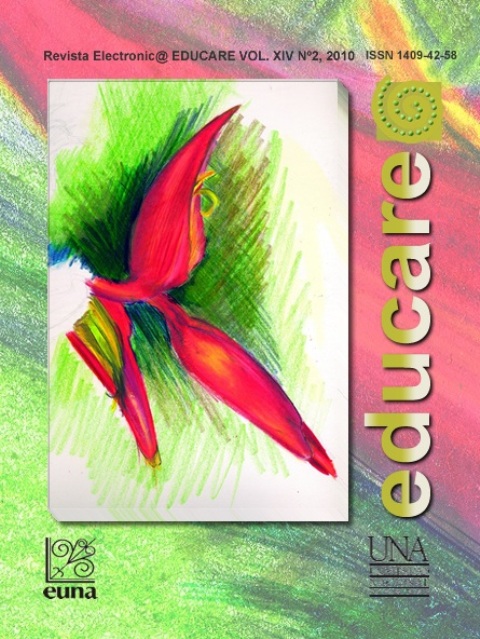Beliefs, Teaching Practice and Proposals for the Attention of Cultural Diversity: the Case of a Costa Rican Teaching and Three Nicaraguans Infants
DOI:
https://doi.org/10.15359/ree.14-2.11Keywords:
beliefs, teaching practice, attention to diversity, interculturalism, methodology, discipline, planningAbstract
This article presents data from a research that studied a teacher belief regarding three Nicaraguan students. Specifically, presents findings related to teaching practice and its relation to diverse education proposals. It includes an analysis of four subcategories: daily dynamic of a teacher who works with infants of another culture, students’ assessment in the classroom, discipline strategies to children, and diverse beliefs and proposals.
The data shows that, in the classroom, the teacher does not demonstrate different treatment to Nicaraguan and Costa Rican children, suggesting that equal treatment is the strategy per se used by the teacher to solve the issue of cultural diversity in the classroom. On the other hand, discipline is assumed by the teacher with scolding criteria, using a loud tone of voice and aggressive vocabulary.
References
Aguado, T., Gil, I. y Mata, P. (2008). El enfoque intercultural en la formación del profesorado.
Dilemas y propuestas. Revista Complutense de Educación, 19(2), 275-292. Reuperado de
http://revistas.ucm.es/edu/11302496/articulos/RCED0808220275A.PDF
Ander-Egg, E. (2001). Los desafíos de la educación en el siglo XXI. Algunas reflexiones sobre los
retos del futuro inmediato. San Fe, Argentina: Homo Sapiens Ediciones.
Besalú, X. (2002). Diversidad Cultural y Educación. Madrid: Editorial Síntesis, S.A.
Bueno, J. (1997). Controversias en torno a la educación multicultural. Recuperado de www.lie.upn.
mx/docs/Diplomados/LineaInter/Bloque2/.../Lec2.pdf
Devalle, A., y Vega, V. (1999). Una escuela en y para la diversidad. El entramado de la diversidad.
Sao Pablo, Brasil: Editorial AIQUE.
Essomba, M. [Coord.], Barandica, E., Sabariego, M., Sandin, M. P., del Campo, J., Viñas, J. et al.
(1999). Construir la escuela intercultural. Madrid: Editorial Graó.
Jordán, J. A. (1994). La escuela multicultural. Un reto para el profesorado. Barcelona: Paidós.
Luft, J. (1999, Febrero). Teachers’ salient beliefs about a problem-solving demonstration classroom
in-service program [Creencias que sobresalen en los docentes con respecto a la demostración
en el aula de resolución de problemas en programas de servicio]. Journal of Research
in Science Teaching, 36(2), 141-158. doi: 10.1002/(SICI)1098-2736(199902)36:2<141::AIDTEA3>3.0.CO;2-P
Lumpe, A., Haney, J., y Czerniak, C. (2000, Marzo). Assesing Teachers’ Beliefs about Their Science
Teaching Context [Evaluación de las creencias de los docentes en relación con su contexto
de enseñanza de las ciencias]. Journal of Research in Science Teaching, 37(3), 275-292. doi:
1002/(SICI)1098-2736(200003)37:3<275::AID-TEA4>3.0.CO;2-2
Maxwell, J. (1996). Qualitative Research Desing an Interactive Approach. United Estates of
America: SAGE Publications.
Pajares, F. (1992, Fall). Teachers’ Beliefs and Educational Research: Cleaning Up a Messy Construct
[Creencias del docente e investigación Educativa: corrigiendo un concepto mal construido].
Review of Educational Research, 62(3), 307-332. doi: 10.3102/00346543062003307
Spanneberg, R. (2001). Teachers’ Beliefs and Practices related to a Professional Development
Programme in South African Rural Schools. En línea: http://www.aare.edu.au/01pap/
spa01178.htm
Schuck, S. (1997, Julio). Using a research simulation to challege prospective teachers’ beliefs about
mathematics [Utilización de una simulación de investigación para retar las creencias propuestas
de maestros acerca de las matemáticas]. Teaching and Teacher Education, 13(5), 529-539.
doi:10.1016/S0742-051X(97)85541-2
Downloads
Published
How to Cite
Issue
Section
License
1. In case the submitted paper is accepted for publication, the author(s) FREELY, COSTLESS, EXCLUSIVELY AND FOR AN INDEFINITE TERM transfer copyrights and patrimonial rights to Universidad Nacional (UNA, Costa Rica). For more details check the Originality Statement and Copyright Transfer Agreement
2. REUTILIZATION RIGHTS: UNA authorizes authors to use, for any purpose (among them selfarchiving or autoarchiving) and to publish in the Internet in any electronic site, the paper´'s final version, both approved and published (post print), as long as it is done with a non commercial purpose, does not generate derivates without previous consentment and recognizes both publisher's name and authorship.
3. The submission and possible publication of the paper in the Educare Electronic Journal is ruled by the Journal’s editorial policies, the institutional rules of Universidad Nacional and the laws of the Republic of Costa Rica. Additionally, any possible difference of opinion or future dispute shall be settled in accordance with the mechanisms of Alternative Dispute Resolution and the Costa Rican Jurisdiction.
4. In all cases, it is understood that the opinions issued are those of the authors and do not necessarily reflect the position and opinion of Educare, CIDE or Universidad Nacional, Costa Rica. It is also understood that, in the exercise of academic freedom, the authors have carried out a rogorous scientific-academic process of research, reflection and argumentation thar lays within the thematic scope of interest of the Journal.
5. The papers published by Educare Electronic Journal use a Creative Commons License:















 The articles published by Educare Electronic Journal can be shared with a Creative Commons License:
The articles published by Educare Electronic Journal can be shared with a Creative Commons License: 



